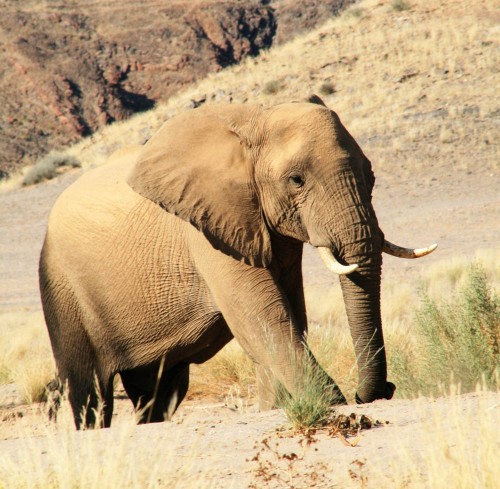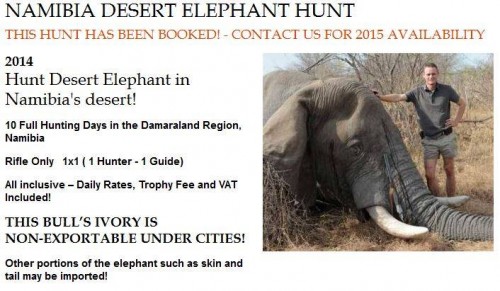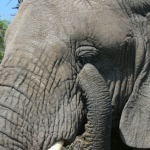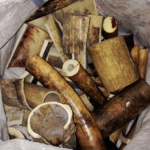
The Namibian government is selling hunting permits for its unique population of rare desert elephants. The only other group of desert-dwelling elephants are found in Mali. Population estimates for the Namibian variety range from the 391 government figure, to around 100 by conservationists. Evidence has surfaced suggesting the ruling party will distribute the meat from the hunted elephants to secure votes in marginalized communities for the November national elections.
A spokesperson for the Namibian Ministry of Environment and Tourism, Romeo Muyunda, recently confirmed the that elephant hunting permits had been issued, saying: “The local people need to benefit from the elephants in some way or another.”
Ruling party South West African People Organization (SWAPO), has in the past received limited support from impoverished voters in Damaraland and Kaokoland, and vote-buying in this fashion is not unheard of in the region: “The last time hunting permits were issued for these desert elephants was also right before elections,” a prominent conservationist who preferred to remain anonymous said in SA Breaking News.
“The local communities will receive the meat from the kill, as well as money for the hunting permits, which they sell on to professional hunters. But the irony is that, spread across everyone in these communities, each person will receive only the tiniest amount of food and money.”
The Namibian Ministry of Environment and Tourism issued a press release on June 2 defending its actions, saying that the desert elephant population – which it pegs at 391 – is the same as all other elephants. It goes on to deem pachyderm conservation status in general as “more than satisfactory” despite the current, well-documented, global poaching crisis. Conversely, it then acknowledges that “the elephants in the Kunene region are being referred to as desert elephants because of their unique adaptation to living in desert conditions” – a nod to the genetic differences they have evolved, including physical characteristics such as larger feet.
Regardless of motive, reducing the gene pool of this already threatened and uniquely adapted group of elephants for financial gain is irresponsible. Moreover, claims that the Namibian people will benefit are short-sighted, particularly since the economic value of such a unique creature is multiplied if kept alive due to potential ecotourism revenues, especially compared to a one-off sale and slaughter. The Kunene Regional Ecological Assessment between October 2011 and April 2013, counted just 86 elephants in the region during almost 500 hours of observation time in a 7,335 km vehicular game count survey.
So far, at least two permits have been sold – one to Discount African Hunts, which has already announced its 2014 Namibia Desert Elephant Hunt has been fully booked:

The other confirmed sale is to Nick Nolte Hunting Safari’s, according to local conservationist group Live Trophy:
“I have spoken to a guide and community leader in Uis [a village located in Erongo Region of Namibia] and the trading of desert elephant lives for political votes has been confirmed. The fact that this is being kept quiet is further proof to me that these are the typical actions of shady politicians. We also know for a fact that one of these permits has already been secured by Nick Nolte of Nick Nolte Hunting Safaris.”
It is unacceptable that this small group of elephants has braved and overcome some of the most adverse conditions on the planet only to now fall victim to the vanity of mankind. To politics. Speak out to protect this precious species from senseless slaughter.
- Sign the petition to be handed to the Namibian Minister of Environment and Tourism
- Contact the Namibian Government directly: Minister of Environment and Tourism U. Herunga ‘s secretary: Mr. S. N. Negumbo Tel: +264 61 284 2333 Email: snegumbo@met.na
- Voice your disapproval by posting a review on the Namibian tourism board’s facebook page (comments are deleted as soon as they are posted)
- Partake in the Tweetstorm to raise awareness on the topic June 8




